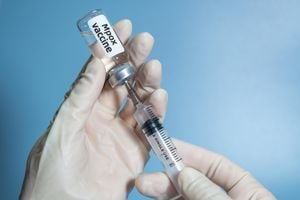Prof Shem Otoi, researcher who predicted the Covid waves, shares his insights

Prof Shem Otoi Sam, author of the book "Defeating Covid-19 in the African Frontline", speaks during the book launch at the Grace Onyango Social Centre in Kisumu on December 19, 2024.
Covid-19! The name still sends chills down the spine of many.
The 2020 pandemic cast a dark shadow across the globe, claiming countless lives and leaving scars that remain etched in the world’s collective memory.
Over 5,700 deaths were reported in the country which recorded over 345,000 cases.
In Kenya, one researcher, Prof Shem Otoi, gained widespread recognition during the pandemic for his ability to predict the Covid-19 waves with remarkable accuracy.
Using a sophisticated mathematical model, Prof Otoi and his team predicted, not just the emergence of multiple covid waves in Kenya, but also provided estimates on the potential number of infections and deaths during each wave. His work did not stop there.
On December 19, 2024, the don launched his book, Defeating Covid-19 in the African Frontline.
“This book is the story of an African, from Africa, recounting first-hand experiences during the pandemic—an account that can only be authentically told by us,” said Prof Otoi at the book launch which was held in Kisumu.
Reflecting on his journey, Prof Otoi recalled receiving an invitation to serve as the Lake Region Economic Block Advisory Committee’s regional coordinator for Covid-19. This role meant relocating from Nairobi to Kisumu, where he would oversee research efforts on the virus and advise the 14 members of the Lake Region Economic Bloc.
As an expert in infectious disease modelling, Prof Otoi’s primary responsibility was to develop Covid-19 predictive models, including the now-famous Otoi- Narima model, in collaboration with colleagues.
He explained that after developing the models, he compared them to traditional models and found that his predictions were consistently more accurate.
The Otoi-Narima model, eventually published in a leading mathematics journal, became an invaluable tool for predicting the waves of Covid-19 in Kenya.
While the models accurately predicted Covid-19 waves in the country, the researcher says he spent a series of sleepless nights doing mathematical calculations.
“Another worry I had was, ‘what if my predictions failed to work?’ I am glad that all of them came to pass, “he said.
Health facilities
Apart from the predictions, Prof Otoi frequented health facilities in the lake region to listen to the experiences of both patients and health workers.
And in 2021, he became more convinced to document the story of Covid-19, having had a firsthand experience with the pandemic.
The author said the book is inspired by the fact that, on most occasions, Africans rarely document such happenings.
“We often read whatever has been written by foreigners. I wanted to have a narrative about an African writing about Africa,” says the mathematician.
The 440-page book, he said, speaks about firsthand Covid-19 experiences, the challenges and lessons learnt.
The Covid-19 regional coordinator also said amid the rising infections from the year 2020, he noticed different people coming up with innovations which were likely to go unrecorded.
“I also realised a number of gaps, that when not looked at now, could cause more harm in case of any possible future pandemic,” he explained.
The book documents people’s experiences, and how they were affected by the deadly pandemic.
The book chapters also highlight innovations, partnerships, pandemic preparedness, the role of media and gender-based violence during pandemic outbreaks among other issues.
The author during an interview also shared that the book has widely covered a chapter on the manufacture of medicines and vaccines in Africa, and why the continent should be self-reliant.
According to the researcher, the frequency of pandemics has increased in the last decade with the world documenting cases of Covid 19, monkeypox, and Marburg among other infections,” he says.
“We have a very interesting chapter in the book about a socioeconomic interruption in the country during the pandemic and the lockdowns,” he explains.
The Great Lakes University of Kenya University lecturer explains that coming up with the book involved a lot of research work both in the media and online, interviews with locals giving their personal accounts and his personal experiences.
He reveals that one of the major challenges he came across was the fact that a lot of information was already online and he needed to be as accurate as possible.
“Everyone saw what was happening on television and any inaccurate reporting would end up in discreditation,” he says.
The aim of the book he says is to make African countries aware of the need to be self-reliant, especially during pandemic outbreaks.
Heavy taxes
He also says it is time African countries learnt to fund their own research and create an enabling working environment for scientists.
“Another major factor is political goodwill. A number of partners would want to establish drug manufacturing companies but we send them away due to the heavy taxes,” he says.
While this is his first book, the infectious disease modelling expert says it will not be his last. Already he has another in the pipeline titled ‘The Science of Pandemic.
The researcher who also identifies as a problem solver says he has also published highly cited papers on solving youth unemployment in developing countries, low and mid-middle-income countries.
His latest piece on monkeypox was published two weeks ago. “We are currently working on a publication comparing Mpox and Covid. That is how I use my god-given power of mathematics to create solutions and improve conditions of human beings,” he says.
The books he says are now available for purchase at the Jaramogi Oginga Odinga Teaching and Referral Hospital at Sh3000.
The researcher says the book can also be found in a number of bookshops in Nairobi while an online copy is available on Amazon.





